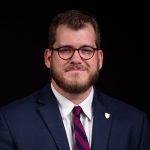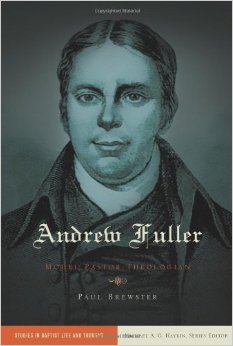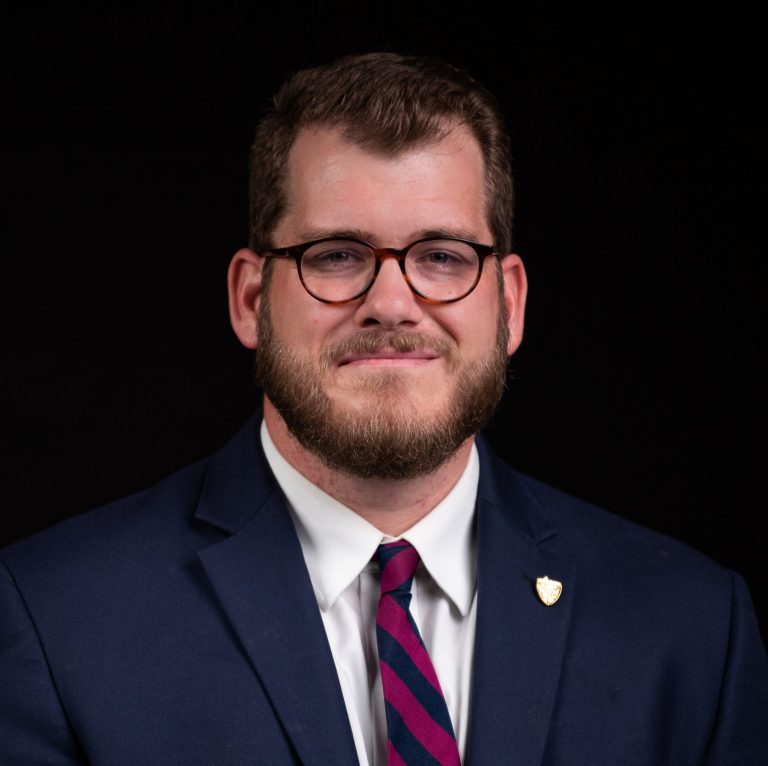Churches are full of pastors and seminaries full of theologians but it is rare to find a pastor-theologian. A pastor-theologian is a man who understands what it means to love God and to love people. Striking this balance is not easy. Many theologians hide in ivory towers and many pastors minister with a dull blade. If strong pastor-theologians are to arise in the ranks then examples are needed. Paul Brewster puts forth such an example in an 18th century English Baptist, Andrew Fuller. Brewster shows how Fuller combined a rigorous theology with faithful spiritual leadership in the midst of doctrinal controversy and an active ministry. He offers Fuller as a model pastor-theologian by focusing on Fuller’s theological method, his soteriology, and his practical ministry.
Brewster begins with a biographical chapter that serves as a backdrop to his main thesis throughout the book. This chapter is important because many of Fuller’s convictions about theology and ministry were forged in the crucible of his experience. He encountered a deeply theological issue in his local church that had significant pastoral implications.[1] This served to wed theology and ministry for Fuller from the beginning. Fuller’s conversion may have had even more influence on his convictions than the controversy in which he was involved. As he looked back on his conversion he lamented that he may have turned sooner had the hyper-Calvinistic teaching at his church not misguided him.[2] These life issues laid a foundation for Fuller’s integration of theology and ministry.
Brewster continues to support his thesis that Fuller is a model pastor-theologian by pointing to his theological method. The manner in which one develops his theology reveals much about him. Some have an eye for detail but not much concern for the affections while others are not concerned with particulars but only the practical. Fuller was able to chart a middle course because of a strong theological approach. His method was both doctrinally sound and experientially rich. Fuller held to the importance of systematic theology yet he did so with humility knowing that man is prone to error. Therefore he stood strongly on the Scripture insisting that all things be brought into subjection to the word of God.[3] Another safeguard to human error was the relationships that he formed with other ministers that not only served as doctrinal accountability but also led to the blending of theology and local church ministry.
Fuller’s soteriology is addressed in the following chapter and it has a primary influence on his standing as a pastor-theologian. Though qualifications have been made, the general consensus is that there was a significant influence of hyper-Calvinism in Andrew Fuller’s day.[4] This hyper-Calvinism led some preachers to withhold from offering the gospel to the unconverted. Fuller stood between hyper-Calvinism on the one hand and Arminianism on the other. In so doing he offered Christ to all men knowing that God would save his elect. His view of the primacy of Scripture helped him navigate this hotly debated issue in his day. Brewster does point out that Fuller’s view on the atonement was the biggest point of controversy and he highlights that Fuller moved away from a commercial view of Christ’s sufferings.[5] Fuller’s view that the gospel is to be extended to all men compelled him to attempt great things in ministry especially in his work for the Baptist Missionary Society.[6] Therefore Fuller’s soteriology serves as a central support for his standing as a pastor-theologian.
Brewster puts forward Fuller’s ministerial work as final evidence that he is a solid example of a pastor theologian. His upbringing laid the foundation, his method and soteriology provided the firepower, and his ministerial work simply lays out the proof. As a preacher Fuller called on all men to put their faith in Christ and he grasped the need of the pastor to know the struggles of those whom he addressed.[7] He used all means to see the unconverted saved including individual meetings with them to share the gospel. He supported evangelism in the local church yet his prayer journal demonstrates that he knew God must do the saving. As secretary to the Baptist Missionary Society Fuller was responsible for the administrative details, which Brewster points out may have become a hindrance to his pastorate. Finally as an apologist Fuller shows that in the midst of such a busy ministry he was still deeply theological. He opposed many different heresies in his day including deism, Socinianism, Universalism, Sandemanianism, and Antinomianism. Fuller’s ministerial work shows that he was a leading theologian and a faithful pastor and these roles did not oppose one another but rather blended together to form a true pastor-theologian.
Paul Brewster has presented Andrew Fuller as a model pastor-theologian and has supported his position as such by showing the relationship between his theology and practice. The evidence is strong that Fuller stands as a prime example of a pastor-theologian. Brewster qualifies his call to model Fuller by acknowledging that all pastors will not be able to function as Fuller, he also points out the need for professional theologians who teach at a seminary level.[8] These qualifications are of value yet they must not be misinterpreted to blunt the need of pastor-theologians in our day. The pace of church ministry has certainly increased but pastors must not let day-to-day pastoral care stop them from consistently addressing the slow build up of theological error. If the pastor abdicates his role to fight off the wolves of heresy to the “professional theologians” then he is no longer fulfilling the qualifications of his office.
In the same way the seminary professional must wrestle with the call to be a pastor-theologian. In Fuller’s life, theology did not only influence his ministry but it motivated him to ministry. There was a force in what he learned about God that led to Christian experience and there was a power in what he discovered about salvation that compelled him to proclamation. Theology and pastoral ministry are not opposites that a man must choose between, rather they go hand in hand and Fuller evidences that there is something intrinsic in the nature of theology that moves the theologian to ministerial practice. If the theologian neglects ministry then not only is he unable to train future ministers but also he will be prone to error. Fuller’s emphasis on relationships and experience in his theological method protected him against that very danger.
Brewster concludes by applying Fuller to our current times and he presents him as a useful guide in the recent resurgence of Calvinism among Southern Baptists. Nathan Finn commends Brewster’s work as a “way forward in the current Southern Baptist discussions over Calvinism”.[9] Certainly Fuller is a source of wisdom in navigating between hyper-Calvinism and Arminianism, which will most likely be more of an issue as this resurgence continues. Jeffrey Riddle sees danger as well but senses the danger being a fall back into Arminianism rather than a movement into hyper-Calvinism[10]. Although these are dangerous heresies there seems to be an equally dangerous one that is a greater threat in our day, Antinomianism. The laws of our society are changing drastically in these days and the Christian’s understanding of the law of God seems to be fading. As Brewster points out, Fuller has much to say on this subject. He would undoubtedly serve pastor-theologians well in the coming years regarding the relationship between the law and the gospel, as well as the function of the law in the Christians life.
Andrew Fuller is presented as a model pastor-theologian in this work. His reliability as a pastor-theologian is seen in his theological method, soteriology, and ministerial practice. Brewster does not view Fuller through rose-colored glasses and thus acknowledges his shortcomings concerning some confusion on the atonement and a potential imbalance in his duties. Even so, Fuller is seen to be an evangelical Calvinist who united a disciplined systematic theology with an experiential practical ministry by a central focus on Scripture. His emphasis on soteriology served as a foundation for an aggressive evangelistic ministry. He stands as a theological hero, defender of the faith, equipper of missionaries, and faithful pastor. Paul Brewster has done future pastor-theologians a great service by extending Andrew Fuller as a model to be followed.
[1]Paul L Brewster, Andrew Fuller: model pastor-theologian (Nashville, TN: B & H Academic, 2010), 18.
[2]Ibid., 15.
[3]Ibid., 47.
[4]Ibid., 70.
[5]Ibid., 94.
[6]Ibid., 135.
[7]Ibid., 111.
[8]Ibid., 173.
[9]“Andrew Fuller- Credo Magazine,” accessed March 6, 2013, http://www.credomag.com/book-reviews/2011/09/26/andrew-fuller/.
[10]“Christ Reformed Baptist Church Charlottesville, VA – Home,” accessed March 6, 2013, http://www.christreformedbaptist.org/.





























